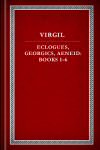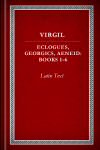Select Works of Virgil (4 vols.)
Digital Logos Edition
Overview
Virgil was one of Rome’s greatest poets. He wrote during the reign of the first Roman emperor, Augustus. Though his life was relatively short—he died at 48—his work left a lasting impression on Western literature. His poem the Aeneid is considered the national epic of Rome. Written after the style of Homer’s Iliad and Odyssey, the Aeneid recounts Rome’s founding myth. The Aeneid, along with his other poetry, became standard in the classroom almost immediately following its publication. Virgil’s influence continued through the development of Western poetry. Dante, for example, made Virgil his guide through hell and purgatory in his Divine Comedy.
Select Works of Virgil contains Virgil’s major works in their Loeb Classical Library editions. Each text is included in its original Latin with an English translation for side-by-side comparison. Use Logos’ language tools to go deeper into the Latin text. You can also use the dictionary lookup tool to examine difficult English words. Whether you’re a classical scholar who wants the convenience of Virgil at a click or a student approaching Latin for the first time, Select Works of Virgil is a must.

Key Features
- Loeb Classical Library editions
- Extensive, in-depth indexes
Product Details
- Title: Select Works of Virgil
- Author: Virgil
- Translator: H. Rushton Fairclough
- Series: Loeb Classical Library
- Publisher: Harvard University Press
- Volumes: 4
- Pages: 1,216
Individual Titles

Eclogues, Georgics, Aeneid: Books 1–6
- Author: Virgil
- Translator: H. Rushton Fairclough
- Series: Loeb Classical Library
- Publisher: Harvard University Press
- Publication Date: 1916
- Pages: 304
This volume contains H. Rushton Fairclough’s English translation of Eclogues, Georgics, and books 1–6 of the Aeneid.

Eclogues, Georgics, Aeneid: Books 1–6: Latin Text
- Author: Virgil
- Series: Loeb Classical Library
- Publisher: Harvard University Press
- Publication Date: 1916
- Pages: 304
This volume contains the Latin text of of Eclogues, Georgics, and books 1–6 of the Aeneid.

Aeneid: Books 7–12, Appendix Vergiliana
- Author: Virgil
- Translator: H. Rushton Fairclough
- Series: Loeb Classical Library
- Publisher: Harvard University Press
- Publication Date: 1918
- Pages: 304
This volume contains H. Rushton Fairclough’s English translation of books 7–12 of the Aeneid and Appendix Vergiliana.

Aeneid: Books 7–12, Appendix Vergiliana: Latin Text
- Author: Virgil
- Series: Loeb Classical Library
- Publisher: Harvard University Press
- Publication Date: 1918
- Pages: 304
This volume contains the Latin text of of books 7–12 of the Aeneid and Appendix Vergiliana.
About Virgil
Publius Vergilius Maro or Virgil (70–19 BC) was born, according to tradition, in Andes, Gaul. He was educated at schools in Cremona, Mediolanum, Rome, and Naples. Virgil died after visiting Greece to revise the Aeneid. Though Virgil wished to have the poem burned, Augustus ordered that it be printed after his death.
About H. Rushton Fairclough
Henry Rushton Fairclough (1862–1938) was born in Barrie, Ontario. He earned an MA from the University of Toronto in 1886 and a PhD in classics from Johns Hopkins also in 1886. He began teaching at Stanford University in 1893, where he remained for the rest of his life. He was awarded an honorary PhD from the University of Toronto in 1922.
Reviews
2 ratings

James W. Fogal
1/1/2014

Larry Proffitt (I
11/23/2013